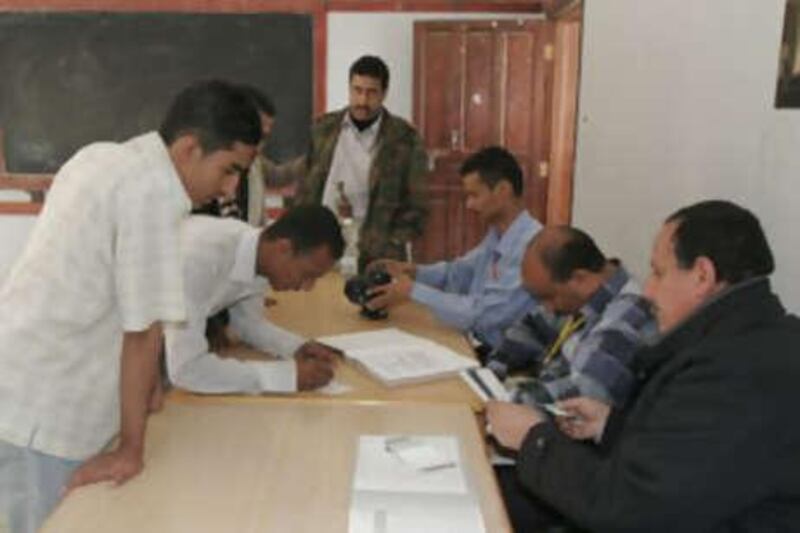SANA'A // The General People's Congress, Yemen's ruling party, said it will not postpone parliamentary elections scheduled for next April if the country's political parties fail to reach an agreement over the poll, despite being advised to do so by the US National Democratic Institute. The GPC and the Joint Meeting Parties, an opposition coalition of five parties that includes Islah, Yemen's main Islamist party, have so far failed agree on an electoral committee to administer the elections.
"The central committee of our party decided in its extraordinary meeting last Thursday to go ahead with the election in its constitutional due time. The opposition is trying to cripple the election and we are not ready to postpone it to satisfy them," said Tariq al Shami, a GPC spokesman. After almost seven months of political debate, the ruling GPC, which holds an 85-per-cent majority in the 301-seat house, pushed through the vote in August after the JMP refused to name representatives to an electoral committee, citing the need to first resolve such outstanding issues as the release of protest leaders in the south who were pardoned in September by a presidential decree.
Parliament instead kept the old committee in place and added three new members. The JMP rejected this and has called its supporters to boycott the parliamentary review of the voter registration process, which began on Tuesday and lasts 15 days. Moreover, by forming an electoral committee without the JMP, the ruling party also scrapped a number of preconditions for next April's vote that had been agreed upon between it and the JMP.
These included barring government officials from using influence to affect the vote, confining the registration of voters to their place of birth or residence and guaranteeing the impartiality of public financing and state-run media during election campaigns. Mr Shami said, however, his party is still willing to negotiate with the JMP. "We are still open to conduct dialogue with all political forces, primarily the JMP. If this dialogue does not bring out any results, this should not stand as a stumbling block before the election and democracy," he said.
The National Democratic Institute had voiced concern over the current political impasse and advised Sana'a to postpone the election until agreement with the opposition on the preconditions and make-up of the electoral committee had been reached. "The Institute is concerned that the current political tensions have made reaching consensus on crucial election issues difficult," the NDI said in a statement. "Without broad agreement on the rules and procedures governing the election, Yemen could experience a political setback with unfortunate consequences for all Yemenis.
Les Campbell, regional director of the Middle East and North Africa for the NDI, which has been Yemen's main democracy development partner for the past 15 years, said co-operation between the two sides was the only solution. Mr Campbell said Yemen had been working toward democracy for over 10 years and that taking a little more time in order to secure democratic gains would ultimately be worthwhile.
"If it takes a bit more time to establish consensus rules and administration for the 2009 elections, it is worth taking that time, consistent with Yemeni law, so that these elections can be seen as a positive step and not a setback," he said. But Mr Shami, the GPC spokesman, dismissed the NDI concerns. "Elections are a national interest and our people have opted for democracy as a means for political transfer of power based on their own choice and not an appeasement to the outside world," he said.
Since 1990, Yemen has been seen by the international community and donor countries as one of the few Arab states taking concrete steps towards democratisation, based largely on three successful parliamentary elections held in 1993, 1997 and 2003. In 2006, presidential and local council elections were described by European Union election observers as "open and genuine" and a "positive development in Yemen's democratisation process", despite some irregularities.
Ali Abdullah Saleh, Yemen's president, who was representing the GPC, won 77.1 per cent of the presidential vote while his main challenger, Faisal bin Shamlan, of the JMP, secured 21.8 per cent. The opposition coalition holds the ruling party responsible for the current impasse and says it refuses to take part in an unfair election that will not bring any change. "We cannot go into an election that is just decoration on a regime that has embroiled the country in the turmoil of wars and economic hardships?" said Mohammed al Sabri, a member of the opposition JMP.
"The way the ruling party thwarted the election bill amendments and the formation of the electoral commission has demonstrated that it only wants our participation to legitimise its stay in power." Mr Sabri said the opposition will not keep silent if the ruling party goes ahead with the election unilaterally. "We will not stay indoors and lament; we will defend democracy and the multiparty system strongly and there will be a public boycott," he said.
malqadhi@thenational.ae





